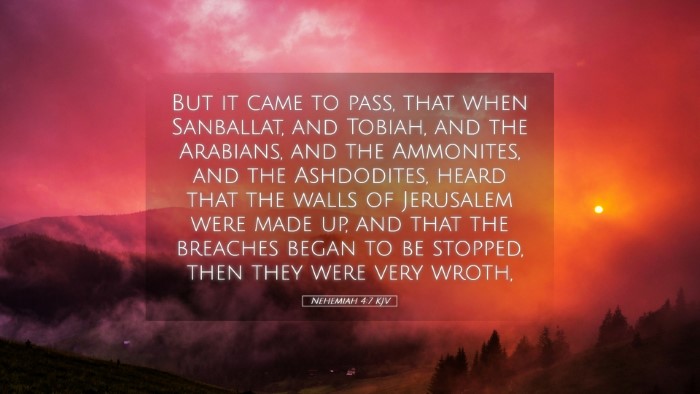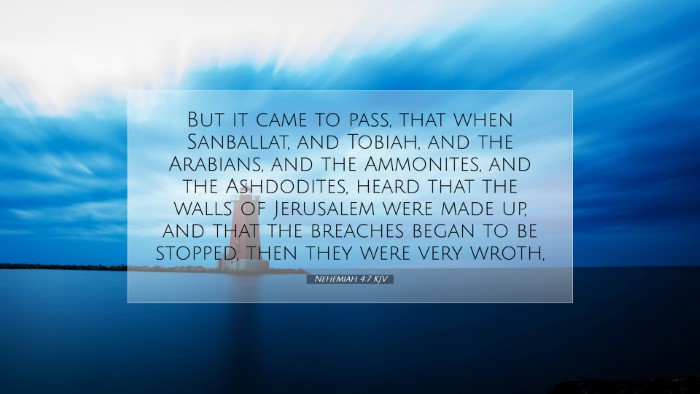Commentary on Nehemiah 4:7
Verse Text: "But it came to pass, that when Sanballat, and Tobiah, and the Arabians, and the Ammonites, and the Ashdodites, heard that the walls of Jerusalem were made up, and that the breaches began to be stopped, then they were very wroth."
Introduction
The verse Nehemiah 4:7 marks a critical point in the narrative of Nehemiah’s leadership and the reconstruction of Jerusalem’s wall. It showcases the opposition Nehemiah faced from surrounding nations, illustrating the broader theme of conflict between divine purposes and human opposition. This commentary draws upon the insights of renowned biblical scholars such as Matthew Henry, Albert Barnes, and Adam Clarke to provide a comprehensive understanding of this verse.
Contextual Background
Nehemiah, serving as the cupbearer to King Artaxerxes, responds to reports of Jerusalem's desolation—a city with broken walls and burned gates. His leadership is marked by a deep concern for his people and a commitment to restoring Jerusalem. As the work progresses, opposition emerges from influential figures: Sanballat, Tobiah, the Arabians, the Ammonites, and the Ashdodites.
Names and Their Significance
- Sanballat: The governor of Samaria, representing hostile local authority.
- Tobiah: An Ammonite official, his very presence symbolizes opposition from within.
- Arabians, Ammonites, Ashdodites: These represent neighboring states with vested interests in keeping Jerusalem weak.
Analysis of the Verse
Matthew Henry observes that the anger of these leaders is a direct reaction to the progress of Nehemiah’s work. They are not merely angry; they are "very wroth," indicating a deep-seated fear of losing influence and control.
Albert Barnes elaborates further on the motivations behind this anger, suggesting that the successful rebuilding of the walls directly threatens the socio-political stability that these leaders enjoyed during Jerusalem's state of disrepair. Their concerted opposition signifies more than personal enmity; it illustrates a collusion of various factions that share a common interest in undermining Jerusalem's restoration.
Theological Implications
Adam Clarke points out that the opposition should serve as a reminder of spiritual warfare that persists throughout history. For modern theologians and scholars, the challenges faced by Nehemiah reflect the external pressures encountered by the Church and believers today. Just as Nehemiah rallied his people to stand firm against their adversaries, Christians are urged to remain steadfast in faith amidst trials.
Lessons From the Opposition
- Unity of Opponents: The united front of Sanballat, Tobiah, and others demonstrates that significant threats to our endeavors often come from a coalition of various opposing forces.
- Awareness of Opposition: Nehemiah’s response to anger teaches leaders to remain vigilant and aware of opposition when pursuing God-given missions.
- Divine Assurance in Adversity: Despite the hostility, Nehemiah consistently turns to God for strength and guidance, modeling dependence on divine support.
Historical Context
Understanding the socio-political landscape of the time is essential. Jerusalem's reconstruction posed not just a spiritual renewal but a potential resurgence of power that could upset the delicate balance of authority in the region. Sanballat and Tobiah were prominent figures who actively opposed Nehemiah’s mission, seeing it as a direct threat to their power. As such, the animosity expressed serves to highlight the real stakes involved in Nehemiah’s rebuilding efforts.
Conclusion
Nehemiah 4:7 serves as a profound reminder of the complexity of leadership in faith-based endeavors. The reactions of Sanballat and others emphasize that any restoration of God's people will attract opposition, but through faith, resolution, and diligent effort, leaders can overcome obstacles. This text is not just historical but a living encouragement for present-day challenges in ecclesial and personal spheres.
In sum, the work of rebuilding the wall of Jerusalem is representative of any restoration project in which God’s people embark. The various responses from foes highlight the necessity of both spiritual preparation and practical action in the face of opposition, a timeless lesson for all who serve in the name of Christ.


